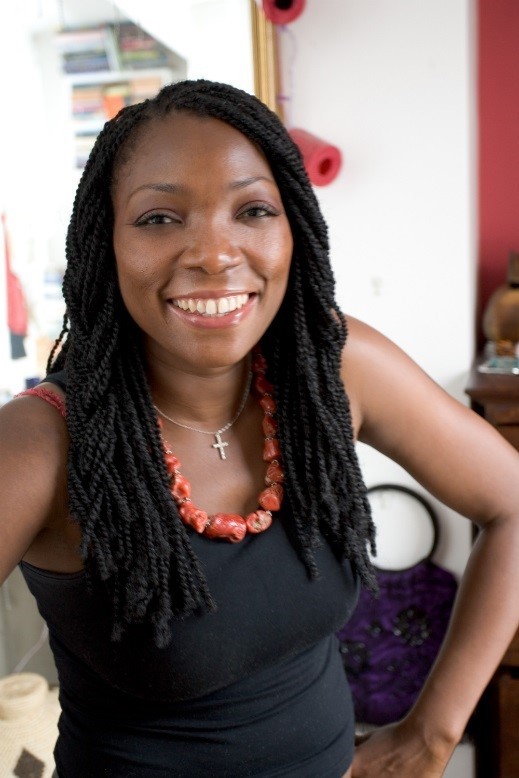Acclaimed poet and performer Dzifa Benson is undertaking a personal, biological and artistic journey to explore the story DNA has to tell about identity in a pilot solo show on 30th October called “The Spit of Me” made possible by a grant from Arts Council England.
Intrigued by her grandmother’s claims that there is German and Trinidadian lineage in their family’s ancestry, this British-Ghanaian writer has taken a genealogical – as well as an emotional – DNA test over the past few months, exploring her emotional responses to what she has uncovered through writing it down in prose and poetry form for the show.
Fascinated by the idea of secrets hiding in the blood at a molecular level, a number of questions occurred to Dzifa, inspiring the show entitled ‘The Spit of Me’: “Identity. What is it? Is it only informed by life experiences or is it in our DNA too? In what ways do we carry secret memories of past ancestors and culture in each drop of blood? Are we more similar than we first imagined?”
The Spit of Me, a pilot theatrical solo show, will combine poetry, storytelling, movement and audio-visual techniques. Produced by leading literature company renaissance one and directed by Jerwood Award winning director, Yael Shavit, the show will shed light on the three essential aspects that Dzifa uses to address notions of identity:
1. Personal and Mythical: Personal narratives from Dzifa’s own family history, searching through generations on the matrilineal side of her family. These narratives also incorporate Ghanaian folklore pertinent to Dzifa’s heritage.
2. Biological: Dzifa has had her genotype analysed in order to discover some of her genetic make-up and ancestry. The information gleaned forms an integral part of her process and ultimately becomes the backbone of her performance.
3. Migration: The story of DNA is also a story of human migration. Dzifa’s stories of her own ancestors’ migrations will help to show how migration influences identity.
The Spit of Me website – http://thespitofme.wordpress.com – will bring alive and complement the show as a legacy document and a multimedia platform designed to extend the life, impact and reach of the project through interactivity. It will make use of innovative technology including transmedia technologies and social media.
The website will stand alone as a work of art in itself. Audio interviews, which will be develop into poems and stories, will be culled from interactions Dzifa has with a range of mixed heritage people whose appearances belie their heritage. It will include a blog that highlights an engagement with current genetic practice but from an artistic point of view.
Dzifa is also being supported by Apples & Snakes, Dr Richard Bowater, Dr Peter Goodfellow and Arts Council, England.
More information on the project: If you are interested in attending or hosting The Spit of Me workshops please get in touch with renaissance one by emailing [email protected] or visit their website www.renaissanceone.co.uk
Notes to editors
Please be aware that the show on the 30th of October is a pilot show and will be subject to change. Journalists are invited to attend the show and let us know of any feedback.
For more information or to reserve seats please contact Sumit Devi, Account Manager, Oxxygen Marketing, on +447983 541 896 or email [email protected]
About Dzifa Benson
Dzifa Benson was born in London to Ghanaian parents and grew up in West Africa. She does four main things – writes, performs, curates and teaches. She has performed her prose and poetry nationally and internationally at venues such as Tate Britain, the Institute of Contemporary Arts, London Literature Festival Southbank Centre, The Purcell Room Southbank Centre, Glastonbury, Latitude and Edinburgh Festivals, the Houses of Parliament, Bristol Old Vic, on tour with the British Council in South Africa & UK, at the Shakespeare & Company Bookshop, Paris and Café Mono in Oslo.
Her writing has been widely published in anthologies, newspapers and magazines including the Guardian, Evening Standard, Poetry Review, Magma, Time Out, the Manhattan Review and Philosophy Now. In 2008, she was commissioned to take part as a core artist in BBC Africa Beyond’s cross-arts, collaborative project, Translations and was writer-in-residence at the Courtauld Institute of Art from 2008 to 2009.
About other members involved in the pilot show:
renaissance one, producer: renaissance one is a leading were nominated for an Ethnic Multicultural Media Award for their show Modern Love at Queen Elizabeth Hall, Southbank Centre,
Curator Melanie, director. She has worked with many leading spoken word artists including Molly Naylor, Warsan Shire and Polarbear on the development of new work She currently leads the Spoken-Word Ensemble based at Roundhouse Camden and is known for her deep appreciation of storytelling and character development.
Apples & Snakes, producer: Apples & Snakes is a leading organisation for live literature with a national reputation for producing exciting and innovative participation and performance work in spoken word. It works with creative individuals and organisations across the country to produce high quality artistic experiences that raise the profile of live literature and push the boundaries of the artform for artists and audiences.
Dr Peter Goodfellow, consultant: Dr Peter Goodfellow is Science Advisor to Abingworth Life Sciences, who is well-known for discovering the male sex-determination gene.
Dr Richard Bowater, consultant: Dr Richard Bowater is Senior Lecturer at the School of Biological Sciences at University of East Anglia.
The Workshops on Offer
As part of The Spit of Me project as a whole, Dzifa is developing a series of workshops that aims to help writers and performers explore the intersection of identity, culture and genetics. Some of the workshops will use devised performance based on biographical research to explore the relationship between performance and text. Some of the workshops are/cover:
1. DNA and Perfect Love: Love is no coincidence. Or is it? Is true love just a cheek swab away? The explosion in direct to consumer genetic tests has meant that dating websites want in on the action and are using the promise of matching potential lovers genetically. This workshop will explore what the study of DNA offers in relation to the idea of romantic perfection.
2. The World is No Place When You’re on Your Own: Genes provide probabilities for behaviour and personality but is nature everything? How much of temperament is learnt? Are we products of our genetic heritage or of our environment? This workshop looks at the genetic implications of identity and how it is affected by adoption or fostering.
3. Home is Where My 5th Cousin Lives: Home. Where is it? How do you define it? Is it to be found in our DNA as well as a geographic location? A geographic location can be identified by culture, religion, food etc. and knowing where or what we call home carries the implication that we know who we are. But do we really know who we are or where we feel at ‘home’? Can our genetic heritage tell us anything significant about this? This workshop considers all the factors that contribute to the notion of home – the personal, the cultural, the migratory AND the science – to inform identity.
4. Constructed Identities: This workshop will use tropes from popular culture such as The Matrix, Terminator, Gattaca and transhumanism, to consider what your genetic heritage didn’t give you. What aspects of your physiognomy, personality traits or emotions would you edit out of your genetic make-up? What would you edit in? What if Google existed in your brain? What if, like bats, you could use echolocation to navigate? Dramatically improve your ability to see in the dark like a cat? What if you could modify your body for artistic and practical purposes as easily as downloading an app?
5. The Spit of You (Who’s The Daddy?): This workshop explores the biological reasons behind why families look both so similar and so different, encouraging quirky writing around the subject of DNA and identity. When you look at yourself in the mirror and see the likeness of your parents’ features, how does that make you feel? Is the nose that you inherited from your father too broad? Have you inherited your mother’s temper? Or your grandfather’s complexion?
6. DNA and the Law: DNA and genetic databases for forensic purposes has been made recognisable by popular programmes like CSI. DNA contains a person’s identity but it also contains other information about a person that can be abused. The retention, by the police, of thousands of innocent people’s DNA raises significant ethical and social issues. This workshop is aimed specifically at young people and considers the thorny issue of civil rights.



